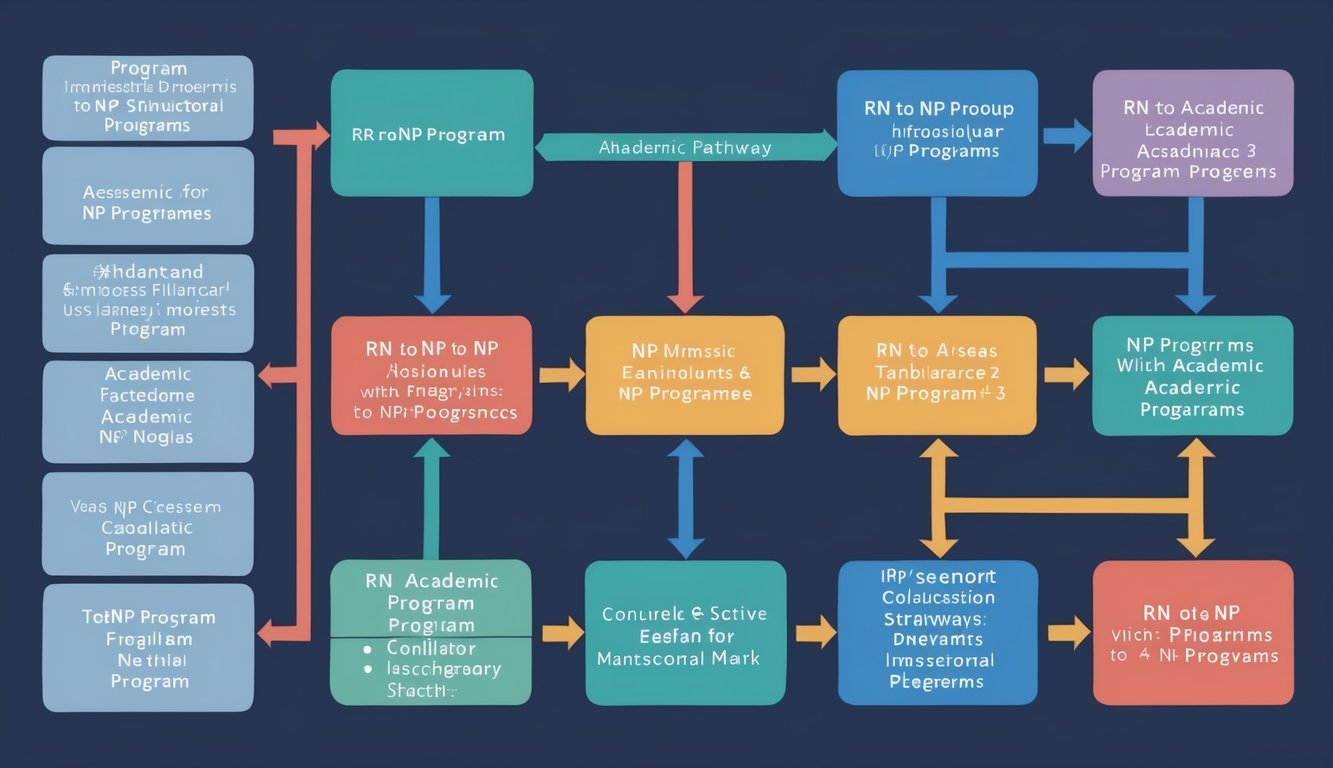RN to NP programs offer a critical pathway for registered nurses to advance their careers and enhance their roles within healthcare.
Pursuing this education enables you to transition from an RN to a Nurse Practitioner (NP).
As a result, you gain greater autonomy, expanded responsibilities, and improved earning potential.
By pursuing this education, you gain the skills necessary to provide comprehensive patient care, including diagnosis and treatment.
As healthcare demands evolve, the need for Nurse Practitioners continues to rise, making this an opportune moment for RNs considering further education.
Many programs cater to the busy schedules of working professionals, with flexible options that allow you to study online or part-time.
For those who have completed an Associate Degree in Nursing (ADN) or a Bachelor of Science in Nursing (BSN), numerous accredited programs are available to facilitate your transition to this advanced role.
Exploring the various RN to NP programs can help you find the one that aligns with your career goals and personal circumstances.
Whether you’re looking at options for online flexibility or specific specialties, understanding the requirements and benefits of these programs is essential.
By taking the next step in your education, you position yourself for a rewarding career that significantly impacts patient health outcomes.
Exploring RN to NP Programs

Transitioning from a registered nurse (RN) to a nurse practitioner (NP) offers significant career advancement opportunities.
Understanding the structure of NP programs and the licensing requirements is essential for making informed choices.
Understanding NP Programs
RN to NP programs provide a pathway to advanced practice nursing.
These programs typically require a Bachelor of Science in Nursing (BSN) as a prerequisite, although some RN to MSN programs accept an associate degree in nursing (ADN).
Courses in these programs cover:
- Pathophysiology
- Pharmacology
- Advanced Health Assessment
Clinical experience is a critical component, allowing you to apply theoretical knowledge in real-world settings.
The duration of these programs generally ranges from two to three years, with options for full-time or part-time attendance.
Flexible formats, including online and on-campus options, cater to different schedules.
RN License and Advance to MSN
To enroll in an RN to NP program, you must hold an active, unencumbered RN license.
This license proves your competency in nursing and is a prerequisite for advanced study.
The transition to a Master of Science in Nursing (MSN) degree involves both coursework and clinical practice components.
Key steps include:
- Maintain your RN License: Ensure it remains active throughout the program.
- Complete Required Prerequisites: Many programs require foundational courses, such as statistics, which can often be completed online.
- Apply to Programs: Applications are typically accepted on a rolling basis.
Consider programs like those offered by Regis College and Clarkson College for structured pathways in advanced practice nursing.
This pathway not only enhances your qualifications but significantly broadens your scope of practice as a nurse practitioner.
Academic Pathways and Program Structure

When considering the transition from a Registered Nurse (RN) to a Nurse Practitioner (NP), understanding the academic pathways and program structures is essential.
Your educational journey can vary based on your current qualifications and career goals, especially in terms of degree options and program formats.
From RN to MSN Degree
Many RNs choose to pursue a Master of Science in Nursing (MSN) as a pathway to becoming an NP.
Programs often accept both Associate Degree in Nursing (ADN) and Bachelor of Science in Nursing (BSN) holders.
Typically, the RN to MSN program combines advanced nursing practice and leadership training while allowing you to earn your degree in a streamlined manner.
For example, this path often includes coursework in pathophysiology, pharmacology, and health assessment, along with clinical practicum hours.
If you hold a BSN, some programs may offer an accelerated pathway, allowing you to complete your MSN more quickly, while programs that accept an ADN might require additional undergraduate coursework.
Accredited institutions provide these programs, ensuring you receive quality education that meets licensing requirements.
ADN to NP Program Options
ADN to NP programs are designed specifically for nurses with an Associate Degree in Nursing who desire to advance their careers.
These programs usually require you to complete additional schooling to attain a BSN before progressing to an MSN.
Some of the popular pathways you might explore include RN to BSN programs, followed by an RN to MSN or directly to NP programs.
This route can be completed online or on-campus, allowing flexibility depending on your personal circumstances and learning preferences.
Choosing an ADN to NP program often entails meeting prerequisites, which may include specific courses in nursing theory and practice.
Many institutions also support your transition with resources for clinical placements and mentorship.
Online and On-Campus Formats
Your learning preferences significantly impact your educational experience.
Many schools now offer both online RN to NP programs and traditional on-campus options.
Online options allow you to fit studies around your work schedule, providing convenience without sacrificing quality.
These programs often feature interactive coursework, virtual simulations, and online clinical experiences, making them suitable for busy professionals.
On-campus formats, on the other hand, provide in-person interaction with faculty and peers, which can enhance learning and networking opportunities.
Some programs may also involve hybrid formats, combining both online and on-campus instruction.
Curriculum and Clinical Requirements

The curriculum for RN to NP programs is designed to equip you with essential nursing knowledge and specialized skills.
It encompasses core nursing subjects, specific tracks, and significant clinical practicum requirements that prepare you for advanced practice.
Core Nursing Subjects
Core subjects form the foundation of your advanced nursing education.
You will study health assessment, which focuses on patient evaluation techniques, and pathophysiology, helping you understand disease processes.
Courses in advanced pharmacology provide knowledge on medication management, crucial for treating acute illnesses and chronic medical conditions.
Other fundamental topics include evidence-based practice and healthcare policy, which inform your clinical decisions and the broader healthcare landscape.
You will also explore ethics in nursing, ensuring you can navigate complex patient care situations responsibly.
Specialized NP Tracks
Depending on your career goals, you can choose a specialized NP track, such as a family nurse practitioner or a psychiatric-mental health nurse practitioner.
Each track provides targeted knowledge and skills tailored to specific patient populations.
For example, if you opt for the pediatric nurse practitioner track, your curriculum will emphasize child health and developmental assessments.
Alternatively, the women’s health nurse practitioner track may focus on reproductive healthcare and disease prevention.
Training in these areas enhances your ability to diagnose and treat patients effectively across various contexts, including emergency and neonatal care.
Clinical Practicum and Training
Clinical training is a critical component of your education that involves hands-on experience in real healthcare settings.
You will complete a specified number of clinical hours, gaining direct experience in patient care.
During your clinical practicum, you will participate in various activities, such as assessing patients, diagnosing conditions, and developing treatment plans.
You may rotate through different specialties, including adult gerontology and women’s health, to broaden your expertise.
These clinical experiences reinforce your theoretical knowledge while developing your competence in evidence-based practice.
The structured environment allows you to practice skills like health assessments and pharmacological interventions under the supervision of experienced practitioners.
Licensure and Certification

To practice as a Nurse Practitioner (NP), you must obtain the necessary licensure and certification.
This involves a series of steps, including national certification and an Advanced Practice Registered Nurse (APRN) license, as well as ongoing education and recertification to maintain your credentials.
National Certification and APRN License
After completing an accredited RN to NP program, you are eligible to apply for national certification through recognized organizations, such as the American Association of Nurse Practitioners (AANP) or the American Nurses Credentialing Center (ANCC).
Steps for National Certification:
- Eligibility: You must hold a valid RN license and graduate from an accredited NP program.
- Examination: Pass the national certification exam, such as the Family Nurse Practitioner (FNP) certification exam.
- Application: Submit your application along with proof of education and experience.
Once you achieve national certification, you can apply for your APRN license.
This license is mandatory for all advanced practice roles and verifies your qualification in clinical competencies required for NP practice.
Continuing Education and Recertification
Continuing education is a vital aspect of maintaining your certification and APRN license.
You are required to complete a specified number of continuing education hours (typically around 25-50) every 2-5 years, depending on state regulations.
Key Points:
- Accreditation: Ensure that the continuing education courses are accredited by recognized bodies.
- Recertification Exams: Some certification boards require passing a recertification exam after a certain period.
- Documentation: Keep detailed records of your continuing education for verification during the recertification process.
Investing in lifelong learning not only helps you keep your credentials current but also enhances your clinical skills and knowledge in patient care.
For more information, visit the AANP or ANCC websites.
Career Advancement and Professional Development
Advancing your career as a nurse requires a strategic focus on professional development and the acquisition of advanced practice roles.
Recognizing the significance of education, clinical experience, and networking can significantly impact your journey toward becoming a Nurse Practitioner (NP).
Advanced Practice Registered Nurse Roles
As an Advanced Practice Registered Nurse (APRN), you will have opportunities to specialize in various fields including Family Practice, Pediatrics, and Psychiatry.
Taking on an APRN role typically requires a Master of Science in Nursing (MSN) or a Doctor of Nursing Practice (DNP).
To transition to an NP role, you will need to complete supervised clinical hours through clinical practicums.
This experience is crucial as it prepares you for direct patient care in diverse healthcare settings.
Additionally, some programs, such as the BSN to DNP, offer streamlined pathways that enhance your qualifications.
Pursuing these advanced nursing careers not only elevates your practice but also positions you as a leader in the healthcare community.
Employment Opportunities in Healthcare
An advanced nursing degree can significantly expand your employment opportunities.
Nurse Practitioners are in high demand across various healthcare settings.
These include hospitals, outpatient clinics, and private practices.
Recent reports state that the need for NPs is projected to grow.
This will lead to more positions and competitive salaries.
Factors influencing this demand include an aging population and a greater emphasis on preventative care.
Specialized roles, such as Psychiatric Nurse Practitioners, can be particularly rewarding.
By engaging in ongoing professional development, you can enhance your marketability and impact within the nursing field.
This includes obtaining certifications or focusing on lifestyle changes in patient care.
For more insight on programs, consider exploring options such as the best online nurse practitioner programs.

